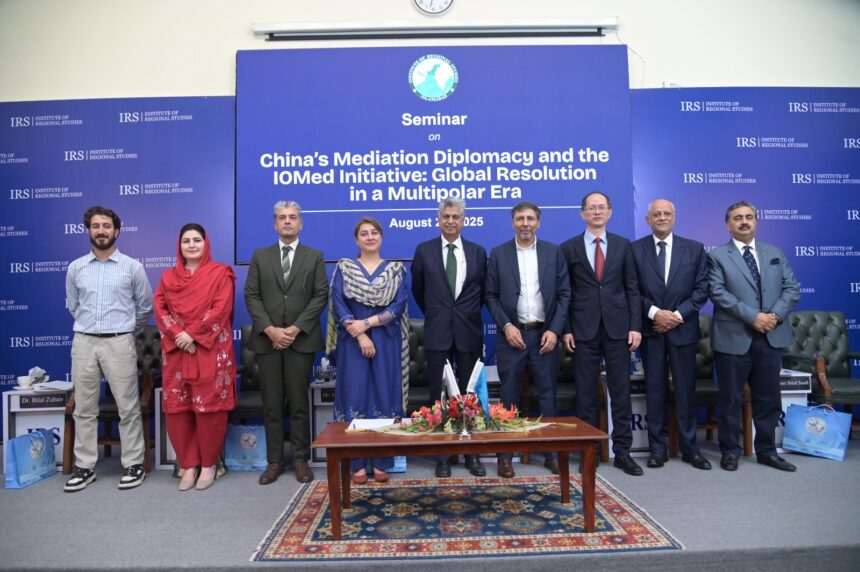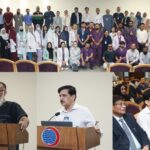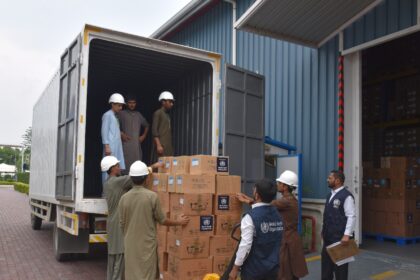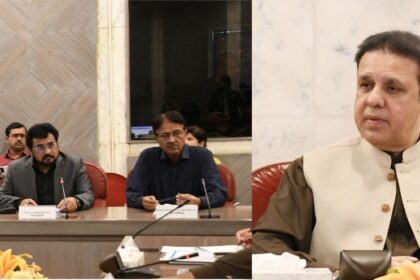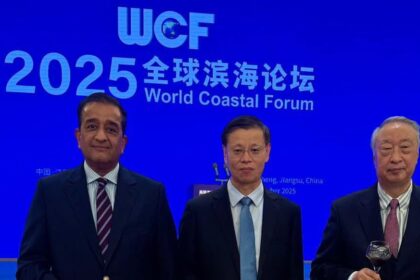A high-level seminar in Islamabad has spotlighted China’s new International Organization for Mediation (IOMed) as a potential game-changer for global dispute resolution, particularly for developing countries of the Global South. Organized by the Institute of Regional Studies (IRS), the event brought together experts and policymakers to discuss how IOMed offers an alternative to traditional, often gridlocked, conflict resolution mechanisms.
Ambassador Jauhar Saleem, President of the IRS, opened the seminar by lauding China’s commitment to promoting stability and cooperation through dialogue. He described IOMed as a significant move toward better global governance, especially as longstanding bodies like the UN Security Council face challenges in resolving conflicts in regions such as Gaza and Kashmir. Saleem emphasized Pakistan’s continued support of China in major initiatives like the Belt and Road, Global Development, and Global Security Initiatives.
Murtaza Solangi, spokesperson to Pakistan’s President, highlighted China’s longstanding traditions of harmony and mediation, noting these values resonate with South Asian cultures. Solangi explained that IOMed, recently launched in Hong Kong with 33 founding members including Pakistan, is designed to handle both state-to-state and commercial disputes. He pointed out that mediation through IOMed reduces legal costs and timelines while protecting sensitive international relations—a practical benefit for countries like Pakistan. He also cited China’s mediation between Saudi Arabia and Iran as a model example.
Representing the Chinese diplomatic perspective, Shi Yuanqiang, Deputy Head of Mission at the Chinese Embassy, described the IOMed Convention, signed by China and Pakistan, as the world’s first governmental body devoted solely to mediation. He linked this achievement to broader calls for reform in global governance and highlighted China’s record as a peacebuilder. Shi stressed the importance of China and Pakistan’s partnership in supporting a fair and just international order and underscored the organization’s role as a public good for developing countries.
Legal expert Ahmer Bilal Soofi noted that China stands out among major powers for its consistent engagement in mediation. He introduced IOMed as a novel institution tailored for resolving technical disputes—such as those concerning water or trade—offering the flexibility required in complex cases. Soofi encouraged Pakistani leaders to consider using IOMed for regional conflicts, arguing that mediation aligns well with local traditions like jirgas and could set a precedent for solutions shaped by the Global South.
Riffat Inam Butt, the first Secretary of Pakistan’s Law and Justice Commission, argued that mediation is becoming the most effective alternative as global litigation becomes bogged down by geopolitics. She suggested that IOMed offers a platform where the Global South can help shape international rules, not just follow them. To build credibility, she recommended initially focusing on commercial disputes while maintaining strong enforcement standards and avoiding perceptions of bias.
Hamid Sharif, President of the Global Think Tank Network and a member of China’s Supreme People’s Court International Expert Committee, described IOMed as a response to criticism of expensive, Western-dominated arbitration bodies. He argued that consensual mediation, which requires parties’ cooperation, could achieve more equitable and sustainable resolutions—especially in the context of rising global multipolarity and use of sanctions as political tools.
Dr. Bilal Zubair from the Center for International Strategic Studies observed that the liberal international order is declining, making China’s strategies of inclusive development and balanced diplomacy increasingly appealing to Global South nations. He said IOMed’s approach—focusing on flexibility, multiple engagement levels, and development—makes it particularly attractive for countries in Africa and South Asia.
During the seminar’s Q&A session, participants explored issues such as how IOMed’s decisions would be enforced, the possible roles for regional organizations, and how Pakistan might leverage IOMed for its own longstanding disputes. Experts agreed that the organization’s success will depend on building trust, ensuring neutrality, and linking mediation outcomes to broader development goals.
In closing, Ambassador Saleem reiterated the IRS’s commitment to advancing discussions on global governance and stressed that IOMed represents a global public good, not solely a Chinese initiative, with special significance for the countries of the Global South.




